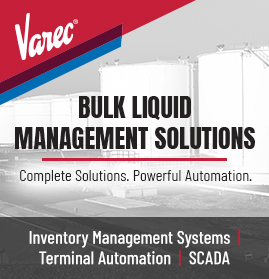Tank World Expo continues to grow with the industry with the 3rd annual show returning to the Dubai World Trade centre in April 2015.
Supported by the Ministry of Energy, Tank World Expo returns to the Dubai World Trade Centre in April of next year. Following the success of the 2014 show, the event looks set to be bigger than ever, providing a definitive platform to uncover new technology and meet the growth and capacity challenges of the region’s tank storage industry.
- Tank World Expo 2014
Having attracted over 1,700 visitors in 2014 and having booked over 40 exhibitors already, the team working
on next year’s showcase team is continuing to work closely with local terminal partners, including Horizon,
GPS Chemoil, Gulf Petrochem and Socar Aurora, as well as supporting global ports DP World, Salalah, Amsterdam and Tarragona to develop the event.

Managing Director, Alex Williamson
Managing Director Alex Williamson has highlighted that this close industry collaboration and focus on providing
value to stakeholders was behind the growth, stating: “We are delighted to continue our close working relationships
with local terminals, global ports and leading analysts to provide value to this growing market and are very excited about the continued development of the show”.
Knowledge partners for the 2015 showcase include Ernst and Young, PJK International and the Ratio Group (Pte) Limited. Patrick Kulsen, managing director, PJK International, is “very much looking forward to be part of this valuable showcase” and Ratio Group managing director Ellen Ruhotas has told us that “it is a pleasure”
to be part of the show.
Other confirmed speakers for 2015 include global leaders, such as: Sanjay Anand, senior vice president, global operations, GPS Chemoil; David Gledhill, CEO, Port of Salalah; and Sharief Habib Al Awadhi, director general, Fujairah Free Zone.
Key Insights
With the show gathering such momentum, STM invited Luke Upton, editor at www.tankworldnews.com, to recap
10 key insights from the 2014 edition.
- The industry is undergoing a shift from crude oil to refined products. Cleaner and lighter fuels and alternate fuels are in greater demand than even before. this is partly related to growing environmental legislation regarding governing fuels and changes in customer demands.
- More investments in independent storage capacity, particularly from traders who are buying into storage capacity.
- Due to decreasing European demand for gasoline, margins for refineries are declining and capacity and utilisation rates at refineries are diminishing. this equates to a reduction in gasoline surplus in Europe.
- The European diesel shortage is increasing because of downsized production and increasing demand in the bunker and automotive market.
- Independent storage is being driven by pressures on time and space, and demand for value added services (blending, heating, drumming, waste water treatment, etc.)
- Both international and regional trends are moving towards greater oversight of ports and terminals, and hence increased regulation
- Lack of skill and knowledge and fear of reprimand for reporting a superior are some of the root causes of critical behaviours leading to HSE failures.
- Autonomy and empowerment of employees at all levels improves, trust, transparency and creates a culture of accountability which in turn improves the safety culture within organizations.
- In developing facilities in new territories local partners are critical as is the close involvement of all partners in implementation and acceptance that administrative procedures to obtain necessary permits and licenses can be lengthy.
- Although tank storage has existed in Africa for decades, increased stability, a growing demand, booming populations and sizeable discoveries of hydrocarbons have fuelled its extensive recent growth with several new facilities being rapidly developed.
In turn Upton also spoke to some experts ahead of the 2015 tank World expo to ask for some insights on key areas to be discussed at the event:
On our changing industry:
“storage is not the prime objective; it’s now the speed of delivery. and this is one of the dynamic changes we are seeing from all concerned in the value chain. and anyone working in our industry has to be extremely flexible. The variety of fluids demanded now is growing all the time and the speed at which the demand for them
changes is quickening. There are so many more types of blends now than when I started out, so taking advantage of market desires is a major opportunity.” –Mark Korzec, director of oil & gas sales, colfax corporation.
On the challenges a modern port faces:
“One of the main challenges is increasing vessel size. Ports need to be well placed to invest to meet the long term
needs of customers requiring increased efficiencies and the capability to handle the increasing size of vessels requiring increased port capacity to meet demand or dated infrastructure. this includes facilities to handle larger
ships that cascade down to more minor routes as the next generation of ultra large container ships (ULCS)
feature on major routes.” – Mohammed al Muallem, senior vice president & managing director, DP World UAE
region
A European shift:
“in north-western Europe we see a shift from refining and production to logistics. While more production moves closer to the source, the oil producing countries, there is an increasing demand for storage, blending and distribution of finished products in Europe. Biofuels and alternative fuels such as LNG and CNG are changing the market rapidly, asking for more variety of (smaller) tanks and blending facilities, compared to traditional storage of crude oil. also
sulphur content regulations in Europe require more added value services from tank terminal operators which
have an impact on the market.”- Peter Geertse, commercial manager, liquid bulk, Zeeland Ports










